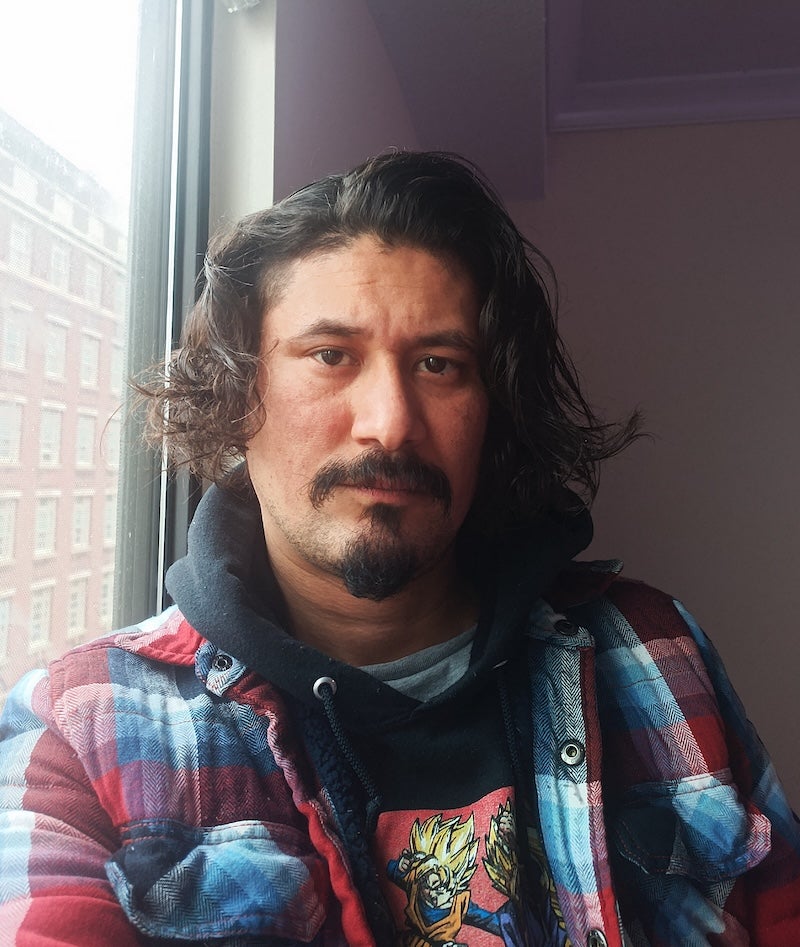Valle worked in Professor John Taylor’s Urban Agroecology Research Lab, which is focused on transitioning food and material goods production from large-scale industrial systems to localized, sustainable processing operations. As part of his fellowship, Valle contributed to the lab’s goal of fostering resilient, community-based agricultural systems that promote environmental sustainability, local food security, and urban ecosystem health.
Q. What did your fellowship work entail?
A. The study of the food networks of immigrants, Black Americans and other people of color who are from the United States, but identify with a minority background (so mainly like Puerto Ricans [I’m Boricua on both sides of my tree, but 3rd generation American; the only thing we kept was Spanish, which helped a lot as the fellowship unfolded], Dominicans, Cape Verdeans, etc…). We catalogued gardens, conducted interviews (I conducted all the Spanish language ones, and translated from English to Spanish and back), took measurements and drew maps of the gardens, and tried to conduct an analysis of the actual networks in the various communities of the research participants. I knocked on doors, mapped out locations using GIS, gained trust with people who might at first be skeptical of our intentions by demonstrating all the good things that could come out of the endeavor.
What was the most fulfilling part about doing the AFS Fellowship Program?
It was awesome doing the research because I am from one of the research areas we looked into – South Side Providence. This area is actually home to the South Side Community Land Trust, a pioneer in urban agriculture. The population it first and still serves is the Hmong people of Southeast Asia. They adapted to being refugees in the United States by pioneering things like urban agriculture, not only here, but in California and Minnesota as well, which are other areas with large populations of that nation. What I’m getting at is that I began to understand a lot of the neighborhood dynamics that took place around me as I was growing up.
How did this hands-on experience enrich your academic experience?
It gave me the academic confidence to apply for graduate school, into which I was accepted soon after. It also gave me the confidence to see myself as an interdisciplinary researcher and even call myself a scientist. This is important for me because I’m a combat veteran (US army infantry 05/11 – 15 month deployment to Iraq from 07/08), I needed a yearlong ordeal – albeit with significantly slower tempo- to reconstitute myself from a warfighter into a scientist.
For folks who are not scientists but would benefit from understanding the work that you did for the Fellowship, what are some main “takeaways” you’d share with them?
It’s never a bad idea to understand how research is conducted. Oftentimes we as a society mock people who do their own research; this is misguided. People’s research should be evaluated on the strength of their methodology and the quality of their data, rather than the credentials of the researcher. Credentials are good but they are also used increasingly to launder some reputation or sell some product which will then be recalled in 5 years after everyone’s been used it.
What advice do you have for students who want to do a fellowship?
Do it. Oftentimes you hear people say, “Ugh, this job requires 4 years experience but I’ve been in school for the past four years.” Guess what: fellowships during college is what they mean. You need to be doing things that build your network, and professionalize you; fellowships are what make that happen. I also think the AFS fellowship should be a right of passage for anyone in the SAFS program because of the sheer breadth of knowledge you gain from participating in the program.
How do you think this experience will help you in the future?
The lessons I have learned will further serve to solidify my scientific toolkit and make me a leader in the disciplines of agroecology and agroforestry. The network I built is solid too. And I know how to expand it and how to maintain it. I’m going to be a badass researcher, and I’m opening up my own field labs -read multiple- and bioprospect and also built agroecoturistic experiences and it’s going to be badass. I want to be the Perry Raso of agroecology! He’s mixed science with high culture, and that is kinda what I want to do but on land, with forests and other ecosystems.
Anything else you’d like to share?
Life is so crazy and beautiful, despite the setbacks, which in fact work in your favor if you take the time to know thyself, which will lead to discernment about the world and will give you the tools you need to fulfill that destiny you set for yourself before you were born.

